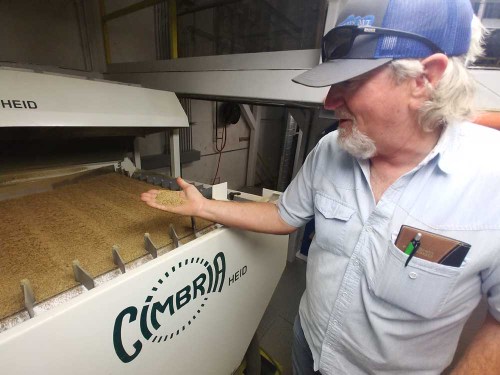Union County grass seed yield higher than recent years
Published 7:37 pm Tuesday, October 13, 2020

- Blue Mountain Seeds Manager Bill Merrigan holds up a handful of grass seed as it is run through the sifting process at the company’s Alicel plant on Oct. 8, 2020. BMS saw an average year in grass seed yield in 2020.
LA GRANDE — Grass seed production in 2020 in Union County proved to be better than in recent years and was buoyed largely by the wet spring, according to Blue Mountain Seeds manager Bill Merrigan.
“Our yields were average, which is better than we’ve had the last two or three years,” Merrigan said of what the company brought in, which was some 20 million pounds of Kentucky bluegrass and fine fescue. “It’s coming back to where we normally are. Some things are probably a little above average, but all in all an average crop.”
The weather largely cooperated to help area farmers get decent crops, with the wet spring accompanied by good moisture last fall and spring/summer conditions that were mild, Merrigan said.
“No extremes either way. It worked out well,” he said.
While grass seed yields are solid for Blue Mountain Seeds, an area of concern in the sector is with exports. Deliveries to China and Europe have been hampered, but Merrigan said BMS is selling more to Canada and more domestically to partially counter overseas losses.
“It probably hasn’t offset it, but it’s helped,” Merrigan said of the domestic sales. “I would say that the business here in the U.S. has probably more than anything helped. We’ve had good business here.”
He said the trade war between China and the U.S. has hurt sales to the world’s most populous nation — but not because of tariffs, of which there are none on grass seed.
“In China particularly, the trade war has hurt their economy bad,” Merrigan said. “When the economy is poor you don’t sell as much grass seed.”
Locally, farmers had yields that were largely above previous years, and one farmer would have been on pace for a record year had flooding in the spring not limited some of his crops.
Still, Imbler’s Wade Bingaman, who grows grass seed as well as wheat, hay, barley and peppermint, was happy with his crops’ overall production.
“We had some really timely rains through the spring,” he said. “We had some flooding in some fields. We lost several fields to high water, but the ones that didn’t flood really benefited from that spring. We felt like some of the fields that flooded probably would have been record crops for us this year. (But) it’s better than we’ve had probably the last five years. It’s one of the best crops in memory.”
What’s impacted Bingaman the most has been prices that plummeted in the spring due to COVID-19. He is waiting for prices to move back up before he sells crops.
“Wheat, for instance, dropped quite a bit in March when the pandemic hit,” he said. “It rebounded a bit, but was lower than we like to see.”
Jed Hassinger, who farms north of Cove with his brother, also was impacted by spring flooding that he said kept him from having a great yield.
“We had a flood event in the spring that flooded out quite a bit of our acreage. We lost a bunch of wheat, had some damage on peppermint and grass seed,” said Hassinger, who also grows alfalfa and sunflowers. “It makes for a lot of extra work and less money. Where it floods, it’s just a total loss. Had it not flooded, it would have been a great year.”
What didn’t flood turned out to produce high yields, he said.
“We hardly had to irrigate because of the wet spring we had,” Hassinger said. “The wheat we just irrigated one time in April. It didn’t need any water after that and the yields were amazing. I wish I could say the same for the price.”
COVID-19 had an impact on price, but Hassinger also said timing mattered.
“Every year is different. This was no exception, and we just have to try and be ready for whatever nature brings our way,” he said.
“It’s one of the best crops in memory.”
— Wade Bingaman, Union County grass seed grower






